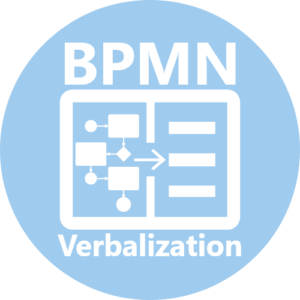BPMN Wording
As part of our ongoing commitment to lead in AI-driven solutions, one of our goals has been to improve the accessibility and usability of BPMN models. Our goal is to enable iKnow-users to easily articulate BPMN models.

As part of our ongoing commitment to lead in AI-driven solutions, one of our goals has been to improve the accessibility and usability of BPMN models. Our goal is to enable iKnow-users to easily articulate BPMN models.

PNA has a rich history of articulating data models, a skill essential for effective communication with domain experts. These articulations, initiated by Prof. Sjir Nijssen , the founder of PNA, are at the core of our fact-based modeling approach. By assigning semantic meanings to technical terms, articulations make it easier to understand complex models.
We build on our experience and introduce articulations in our iKnow Processes module. In doing so, we conducted research on the effects of wordings on understanding BPMN models. This research shows that wording is perceived as a pleasant support for the abstract BPMN symbols. Descriptive text can clarify the model, especially for those who are new to BPMN.
Wording can also be useful when teaching and learning BPMN. For newcomers to BPMN, the numerous symbols are often confusing. By providing a narrative explanation, we make it easier for students not only to recognize each symbol, but also to understand how they can be used together. This method could contribute significantly to learning process modeling.
In addition, wording serves as an effective verification tool to ensure that a process model accurately reflects the intended process. A well-drafted wording should flow logically and describe the process accurately, confirming the correctness of the model.
At PNA, we develop two types of wording: technical and natural. Currently, we have developed the wording in English. Therefore, you will see the following examples in English. We are working to create these wordings in Dutch as well.
Technical wording is created using a template that assigns a specific textual description to each symbol or combination of symbols, with certain variables changing to reflect the symbol’s title. Below is a demo of this type.

Natural articulations leverage the power of generative AI. By combining technical wording with the capabilities of large language models, we produce complete and grammatically correct descriptions of processes. An example of this type of phrasing can also be found in the demo below.

The store replenishment process begins promptly at 6 a.m. when the signal for the workday is received. The initial activity is preparing the store shelves.
Once the delivery arrives, the process participants unload the delivery van and confirm the receipt in parallel. After these actions are completed, the delivery is unpacked, and the process participants assess the type of books.
Depending on the outcome of the book assessment, different steps are taken. If the book type is “Always,” the books are placed on the shelves. If it is a “Best seller,” they are placed on the best seller display. If they are “On sale,” they are displayed on the sale display. After these actions, the process synchronizes.
Finally, based on the outcome of the previous task, the books are placed accordingly. The process concludes with the delivery being handled.
To that end, we offer our BPMN 2.0 workshop, which introduces you to our best practice for using the BPMN standard, based on real-world examples from your organization, if desired.
In addition, you will be introduced to the CogNIAM method of integrating processes with data, business rules and semantics to create a complete knowledge model.
We also offer this workshop in a blended learning variant through our MiKnow platform, in which we go one step further: Fully customized, we put together a training course that includes in-house workshops by our experts, complemented by instructional videos and interactive exercises via our blended learning environment where participants can also track their own progress and receive advice and guidance from our content experts.
Customized BPMN 2.0 via MiKnow